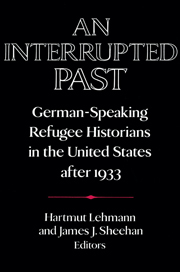Book contents
- Frontmatter
- Introduction
- PART I: Introduction
- 1 German and American Historiography in the Nineteenth and Twentieth Centuries
- 2 German Historiography during the Weimar Republic and the Émigré Historians
- 3 The Historical Seminar of the University of Berlin in the Twenties
- PART II: Introduction
- 4 Refugee Historians in America: Preemigration Germany to 1939
- 5 “Uphill Work”: The German Refugee Historians and American Institutions of Higher Learning
- 6 Everyday Life and Emigration: The Role of Women
- 7 The Special Case of Austrian Refugee Historians
- 8 Schicksalsgeschichte: Refugee Historians in the United States
- 9 German Historians in the Office of Strategic Services
- 10 The Refugee Scholar as Intellectual Educator: A Student's Recollections
- PART III: Introduction
- 11 German Émigré Historians in America: The Fifties, Sixties, and Seventies
- 12 The Americanization of Hajo Holborn
- 13 Explaining History: Hans Rosenberg
- 14 Ernst Kantorowicz and Theodor E. Mommsen
- 15 Refugee Historians and the German Historical Profession between 1950 and 1970
- Conclusion
- Index
13 - Explaining History: Hans Rosenberg
Published online by Cambridge University Press: 05 January 2013
- Frontmatter
- Introduction
- PART I: Introduction
- 1 German and American Historiography in the Nineteenth and Twentieth Centuries
- 2 German Historiography during the Weimar Republic and the Émigré Historians
- 3 The Historical Seminar of the University of Berlin in the Twenties
- PART II: Introduction
- 4 Refugee Historians in America: Preemigration Germany to 1939
- 5 “Uphill Work”: The German Refugee Historians and American Institutions of Higher Learning
- 6 Everyday Life and Emigration: The Role of Women
- 7 The Special Case of Austrian Refugee Historians
- 8 Schicksalsgeschichte: Refugee Historians in the United States
- 9 German Historians in the Office of Strategic Services
- 10 The Refugee Scholar as Intellectual Educator: A Student's Recollections
- PART III: Introduction
- 11 German Émigré Historians in America: The Fifties, Sixties, and Seventies
- 12 The Americanization of Hajo Holborn
- 13 Explaining History: Hans Rosenberg
- 14 Ernst Kantorowicz and Theodor E. Mommsen
- 15 Refugee Historians and the German Historical Profession between 1950 and 1970
- Conclusion
- Index
Summary
In the works which consider refugee historians, Hans Rosenberg usually commands special attention. From the very beginning of his career he belonged to that illustrious group, the students of Friedrich Meinecke. Later in his career he was honored with two Festschriften in West Germany, one edited by Gerhard A. Ritter in 1970, the other edited by Hans-Ulrich Wehler in 1974. The authors who have contributed to these commemorative volumes and who have been influenced by Hans Rosenberg in one way or another constitute an outstanding group of scholars in their own countries. They hold chairs mainly in the United States and West Germany but also in Israel, Canada, and Austria.
In this essay I will comment briefly upon three subjects: I shall consider, first, major aspects of Rosenberg's scholarly work; second, his position as a German-American refugee historian; and third, Hans Rosenberg as teacher and mentor of younger colleagues and students.
From its beginnings in the Meinecke school, Rosenberg's intellectual path toward the kind of social history for which he became well known was long and adventurous. Even in his early works on liberalism, he began to free himself from elitist views of Geistesgeschichte and take a more "democratic" view of history. Instead of focusing upon how ideas of liberalism influenced leading figures, he examined how group mentalities shaped historical events.
- Type
- Chapter
- Information
- An Interrupted PastGerman-Speaking Refugee Historians in the United States after 1933, pp. 180 - 187Publisher: Cambridge University PressPrint publication year: 1991
- 1
- Cited by

